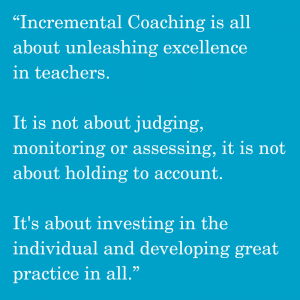Teach - our monthly best practice newsletter featuring tips and practical advice from Ark, our partners and our friends.
Sign up for Teach now to receive teaching tips direct to your inbox.

Damian McBeath is the Executive Principal of Ark Conway Primary Academy in London.
He is a Regional Director for Ark Schools Primary in London.
Ark Conway has achieved a great deal of attention in the 6 years since opening. It has continually achieved some of the best results in key stage 1 in the country. The decision to implement a model of incremental coaching to improve the quality of teaching and learning has been key in creating a high performing, reflective staff team.
Ark Conway is a non-selective, non-denominational one form entry primary school. We have spent a great deal of time and effort ensuring our teachers are continually looking to reflect and improve. Our aim was to create a culture for sustained and continuous improvement. Always learning. Those small marginal gains made famous by Clive Woodward with the England Rugby Team and David Brailsford with British Cycling.
I learnt about incremental coaching through the Education team at Ark, who were using techniques from Paul Bambrick-Santoyo’s book, Leverage Leadership, after observing his methods in action at Uncommon Schools in America. Teacher training and development is central to Ark’s mission, so the central team was keen to share this with principals across the network.
Incremental coaching is all about developing great teachers. The process is led by an ‘instructional lead teacher’. This is an outstanding practitioner who demonstrates exemplary skill as a teacher and the ability to recognise key drivers for improvement.

Typically, in incremental coaching models, the instructional lead observes a lesson and then identifies one specific area, such as a technique, habit or skill, for further development. They then discuss this with the teacher during a short coaching conversation on the same day. Frequent, focused meetings are hallmarks of incremental coaching.
The instructional lead must focus their coaching on just that one key step, which then becomes a development target for the teacher. They need to identify what will make the biggest difference. The following week, the instructional lead will observe whether the teacher has improved their practice, before moving on to the next step. These elements become habits, freeing up focus for teachers to think about further improvements.
The steps can seem like minor things. For instance, it might be that the instructional lead notices the teacher can’t see the whole class from where they are standing. In their coaching discussion, they talk about where they stand and how they hold themselves. These conversations take place in the classroom, so that they can walk the space together and practice positioning. By turning feedback into ‘practice’ teachers get the rare opportunity to rehearse delivery with real-time support and guidance.
It might be that the teacher needs to work on their voice and how they project across the room. Or even something as simple as when it’s best to use open-ended questions versus non-open-ended questions. The emphasis on small, gradual improvements is what makes it more effective than traditional coaching methods.
It’s not been a completely bump-free ride. When we first decided to replace our existing models, and told everyone that the instructional leads would be using video in the classrooms to capture observations, some parents and teachers had concerns. They wondered how exactly the video would be used. But once everybody saw it in action they could actually see how beneficial the new method was. As you are focussing on just one thing at a time, each small change or improvement became perfectly clear on those tapes.
Incremental coaching is now very much a part of the culture here at Ark Conway. Our staff meetings have completely changed – we now call them ‘masterclasses’, and teachers bring videos from their classes to show what worked well, what needs improvement. It’s a great way for staff to collaborate and develop one another.
Teachers find it less intrusive and judgemental than the old system too, in which a senior leader would observe them once every half-term and then follow up with a series of steps for improvement. Incremental coaching feels less critical, because it focuses on pedagogy, not personality and tackles issues one step at a time.
But does it really work? We certainly believe so. At Ark Conway, 100% of KS1 pupils reached expected outcomes in Reading, Writing and Mathematics combined over the past three years, putting it amongst the top schools in the country. The school was deemed to be ‘outstanding’ by Ofsted inspectors in 2013 who remarked, “Teachers set high expectations for learning and behaviour and pupils respond extremely well.”
This method of coaching has allowed us to have a significant push on teaching and learning without resorting to the pressure of increased monitoring visits. I don’t believe there is any irony in the fact that Ark Conway has seen incremental, but unmistakable, improvements in student outcomes since we started doing incremental coaching sessions with our teaching staff.
A report into incremental coaching has been commissioned by Ambition School Leadership and can be read here.
A version of this blog originally appeared on the Tes website. You will need to register and log in to read the blog here.

